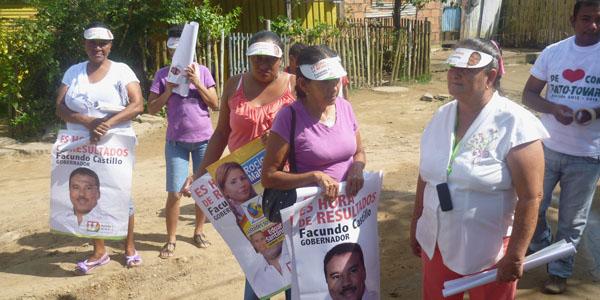Local Elections In Colombia Fraught With Problems
Supporters of Facundo Castillo holding campaign posters in an Arauca slum. (Photo: John Otis)
By John Otis
Colombia is home to one of Latin America’s oldest democracies. Still, its elections are not always clean and tidy. Facundo Castillo is running for governor of Arauca, an oil-rich state on the Venezuelan border. Castillo gets a warm reception going door-to-door. But his political rivals claim Castillo and his family have close connections to Marxist guerrillas, who control much of the surrounding countryside.
Castillo insists he has no links to the rebels. Serious questions have also been raised about Castillo’s main opponent in the race for governor, Carlos Pinilla. The leader of Pinilla’s own party has denounced him for his ties to a jailed politician who sponsored paramilitary death squads.
Part of the problem in policing local elections is the sheer volume of candidates. There are 130,000 candidates running in the October 30 elections for governor, mayor and local councils. More than 10 percent have criminal records, according to Colombia’s interior minister.
Candidates often campaign in remote areas controlled by guerrillas and drug traffickers. Armed groups have killed about two dozen candidates on the campaign trail over the past five months. In other cases, experts say, the groups are backing candidates with cash.
“It doesn’t sound like democracy,” said Andres Ceballos of the Electoral Observation Mission, an independent monitoring group based in Bogota. He said rebels and drug traffickers want to elect mayors and governors who will turn a blind eye to their criminal activities.
“That collusion between these actors is really what puts at risk the elections,” Ceballos said.
Violence and corruption have also marred recent local elections in Mexico and Central America.
“We’ve seen that in Guatemala, in the Honduran elections, Salvador,” said Nhelly Saleh-Ramirez, of the International Foundation for Electoral Systems in Washington. She added that most outsiders focus on Latin America’s presidential elections, which have been mostly free and fair, but they pay scant attention to state and local races.
“For the most part, the international community feels that the Americas have ‘graduated,'” she said. “But we have definitely seen a backsliding of democracy in the region.”
Intimidation is not the only problem. Out in the sticks, it is easier for candidates to get away with wrongdoing.
In the city of Arauca, a reporter named Eduardo Cedeño recently discovered that one of the mayoral candidates has plagiarized the political platform of another politician. Cedeño said vote buying is also common.
“Gubernatorial candidates will pay up to $40 for people’s votes while mayoral candidates pay $10,” he said.
On the Arauca River, which forms the border with Venezuela, Jose Ceballos makes a living taking passengers across the river in a wooden motor boat. He is 48 and cannot read or write.
He said the Arauca government gets millions in oil revenue, but corruption has left his state mired in poverty.
“On election day, the politicians give you money to vote for them,” he said. “But look at the streets. They’re full of holes. Look at the public housing in Arauca. It’s horrible.”
Gubernatorial candidate Castillo promises a new era of honest government. Yet his campaign tactics have raised eyebrows. Castillo, a doctor, doesn’t buy people’s votes, but he does set up free mobile clinics in the slums of Arauca and personally attends to potential supporters. Castillo’s team also provides dental checkups, soft drinks and haircuts for the kids.
Just to make sure people remember who to vote for, loudspeakers play songs with lyrics extolling the virtues of Facundo Castillo.
Every day, reporters and producers at The World are hard at work bringing you human-centered news from across the globe. But we can’t do it without you. We need your support to ensure we can continue this work for another year.
Make a gift today, and you’ll help us unlock a matching gift of $67,000!
